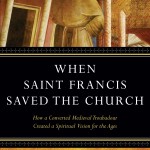What is the “correct” position on subsidiarity, or any other issue, for a Catholic when the USCCB, the catechism, various encyclicals, popes’ comments and the Bible don’t all agree? Which has authority? Or is there a “correct” position? A reader, Anne, commented on my recent post about subsidiarity and it brought up enough to turn my response into a separate post. First, here’s her comment:
SUBSIDIARITY, COMMUTATIVE JUSTICE, SOLIDARITY are not obscure and are all contained within the “CATECHISM of the CATHOLIC CHIURCH, Second Edition”. These are all part of Social Justice and must be taken in entirety – as everything within the CCC must.
The CCC is from the Church Magisterium. See the comments from Popes John Paul II and Benedict.
http://whatcatholicsreallybelieve.comIn addition see “We can not spend what we do not have” – by Bishop Aquila
http://cal-catholic.com/wordpress/2012/08/22/long-term-consequences/
I’m not sure if Anne is criticizing my original post or not. She begins by saying that subsidiarity is not “obscure” — a word I used in my original post — but rather easily discoverable in the Catholic Catechism. She may have just misunderstood my use of the word “obscure,” which can have different meanings. I thought it was plain that I did not mean “not clearly defined” but rather the much more common meaning of “not well known.” If, rather, she were suggesting that every Catholic should already know the Catechism by heart and not need instruction, then that is unfair and unhelpful, I think. Most Catholics do not know the teaching, and it was my purpose to help them and non-Catholic readers get up to speed if they were interested.
The main theme of the links Anne offered is the question of what has authority — who or what Catholics should listen to when it comes to deciding what is the Catholic position. The first link she offered seems to say the only two options are the Bible and the Catechism. Of course there are also the great doctors and other saints of the church; there are encyclicals by popes past and present; significant sources from revered teachers who are not recognized as saints; and theologians throughout the ages. There are even previous versions and edits of the Catechism. Altogether with the Bible, these Catholic sources offer a rich and ongoing conversation about Christian responses to the world and the individual spiritual journey.
This range of sources, however, creates a problem. If you are a fiscal conservative Catholic and the current pope, Benedict, puts out an encyclical like “Charity in Truth” that celebrates trade unions and supports governmental solutions to economic problems, what do you do? You point to other teachings that seem to denounce those things. Or you claim he didn’t really write it, but rather that progressive forces within the bureaucracy pushed it through. When the U.S. Conference of Catholic Bishops denounces Paul Ryan’s budget as contrary to Catholic social teaching, how do you insist it’s the opposite? You narrowly interpret a few passages from Pope John Paul II’s or Pope Benedict’s encyclicals as a rebuttal — leaving out the context of those passages, and ignoring the encyclicals of earlier more socialistic popes. Those who point to the call for us all to be our brothers’ keepers as full justification for ever-expanding middle class benefits are also bending the teachings to suit their political views.

Even the carefully selected quotes from Popes John Paul and Benedict, presented as proof that a practicing Catholic must agree with everything in the Catechism, simply don’t say that. They hold up the Catechism as the distillation of current church teaching. Saying it’s official says neither that it’s inerrant nor that you are forbidden to disagree with it. The range of teachings in the Catholic Church coming from authoritative sources includes many seeming and real contradictions, just as do the teachings in the Bible. This is simply a reflection of the richness and multifacetedness of Truth.
In the second link, Archbishop Aquila asserts that Ryan’s plan to cut food stamps for today’s poor is the essential and appropriate response to concerns about the country’s future solvency — that it is in the best interest of those poor recipients of aid. This is hard to swallow. Worse, his characterization of those who disagree with Ryan’s budget as including “a few American bishops” is disingenuous. He knows full well that the U.S. Conference of Catholic Bishops has officially and repeatedly denounced parts of the budget as directly contradicting Christian charity generally and the Catholic preferential option for the poor specifically. There is a whole page on the USCCB website that explains this view and includes links to all the letters they’ve published on the subject.
It’s also amusing to read the archbishop’s article after the first link that says the only authorities are the Bible and the Catechism. Because in making his case, Archbishop Aquila relies on quoting St. Augustine, St. Thomas Aquinas, an interview with Pope Benedict that has no formal standing, and lines spoken by the fictional killer Don Corleone in Mario Puzo’s The Godfather, while never mentioning either the Bible or Catechism.
I completely agree with Archbishop Aquila when he says “there is room for considerable debate on particular policy choices or initiatives” and that we should be having this debate. We cannot ignore the fiscal mess. We were running surpluses under President Clinton and we can get there again. But cutting aid to the very poor while adding four trillion in new tax cuts just doesn’t even make sense if the crisis is as great a concern as the archbishop and Rep. Ryan suggest.
Whether President Obama wins reelection as expected or not, this fiscal crisis will have to be addressed. So, yes, let us continue the discussion.















